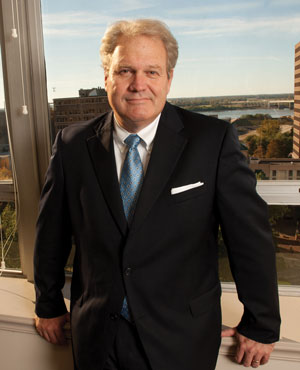Courts use special masters, mediation to help solve e-discovery issues

Robert Moore. Photograph by David Mudd.
Moore, the managing partner of Heaton and Moore in Memphis, Tennessee, was in the discovery phase of a wrongful death suit. He retained an information technology expert to find data requested by the plaintiff, but the plaintiff was not satisfied and a special master was appointed.
The special master found the missing data. And while that information was not dispositive to Moore’s case, the experience did lead Moore to send correspondence early to clients about retention of evidence and to make his discovery requests’ search terms more detailed. Perhaps most important, Moore gained “a clear understanding that nothing electronic is ever lost.”
As lawyers like Moore come face to face with the challenge of ESI and e-discovery, courts are helping by cultivating the use of special masters, education and mediation.
In 2010, Chief U.S. District Judge Joy Flowers Conti of the Western District of Pennsylvania guided the creation of the Electronic Discovery Special Masters program. Conti says that because of the technical nature of the issues, some cases required extra work that the “court wasn’t well-equipped to do.” The program sought individuals who were equipped for the technical, legal and ethical aspects of e-discovery.
Numbering about 40, the program’s special masters are used in criminal and civil cases. They have resolved disputes around preservation and search methodology, Conti says, which has sped up the discovery process. In cases where special masters are not appointed, the local bar turns to the special masters roster to find local e-discovery experts.
EDUCATIONAL APPROACH
Taking a different approach is the electronic discovery pilot program of the 7th U.S. Circuit Court of Appeals at Chicago. With an emphasis on education, the program created principles for e-discovery, a model discovery plan and a model case-management order. The program also provides a mediation service.
The need for mediators became apparent to Christopher King, a Chicago-based partner at Dentons and a committee member of the program since 2009, during its initial years. “People who do not regularly practice in the electronic discovery area can struggle to apply the principles to their specific case,” King says.
The program’s accomplishments are proven, he adds, with its model documents being used in state and federal courts in Arizona, California, Colorado and Kentucky.
Not everyone, however, is smitten with the profession’s current trajectory regarding e-discovery.
“I think something’s wrong when lawyers have to go and hire other lawyers for e-discovery,” says Senior Judge R. Stanton Wettick Jr. of Pennsylvania’s Fifth Judicial District. Referring to the use of special masters, he worries that e-discovery is “making hay out of something that is just a procedural issue.”
E-discovery expert Craig Ball of Austin, Texas—who was the special master for Moore’s case—sees more than procedure in the problem. “Digital is different,” Ball says. “Can you use the law that emerged from paper discovery to guide you to solve many of the problems of digital discovery? Absolutely. … But the language of electronic information is different. The issues themselves have some unique wrinkles that mean you can’t just print it out and resolve it in the way you did in the past.”
Steven Teppler, a member of the ABA’s e-Discovery and Digital Evidence Committee, thinks the coming changes to Rules 16 and 26 of the amended Federal Rules of Civil Procedure, which expand the rules as they pertain to e-discovery, will increase demand for programs like the ones in Pennsylvania and the 7th Circuit.
“Many state courts take their cue from the federal rules,” says Teppler. “For example, here in Florida, the circuit courts will follow federal law until state law becomes more mature.”
That being said, Teppler emphasizes the “special” in special master, and that most cases are not complex enough to justify the appointment of one. Teppler believes the onus to understand e-discovery rests with attorneys.
“It’s high time the legal community began to bone up on what they need to know in light of the fact that most discovery these days is electronic in nature.”
This article originally appeared in the January 2016 issue of the ABA Journal with this headline: “Offering e-Help: Courts use special masters, mediation to help solve ESI issues.”
Write a letter to the editor, share a story tip or update, or report an error.


